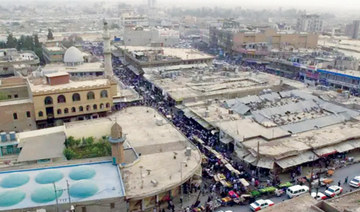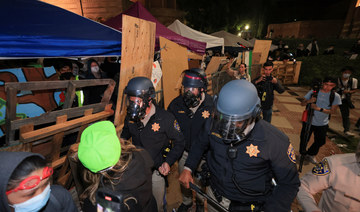IRBIL, Iraq: Complexes of McMansions, fast food restaurants, real estate offices and half-constructed high-rises line wide highways in Irbil, the seat of the semi-autonomous Kurdish region in northern Iraq.
Many members of the political and business elite live in a suburban gated community dubbed the American Village, where homes sell for as much as $5 million, with lush gardens consuming more than a million liters of water a day in the summer.
The visible opulence is a far cry from 20 years ago. Back then, Irbil was a backwater provincial capital without even an airport.
That rapidly changed after the 2003 US-led invasion of Iraq that toppled Saddam Hussein. Analysts say that Iraqi Kurds – and particularly the Kurdish political class – were the biggest beneficiaries in a conflict that had few winners.
That’s despite the fact that for ordinary Kurds, the benefits of the new order have been tempered by corruption and power struggles between the two major Kurdish parties and between Irbil and Baghdad, the Iraqi capital.
In the wake of the invasion, much of Iraq fell into chaos, as occupying American forces fought an insurgency and as multiple political and sectarian communities vied to fill the power vacuum left in Baghdad. But the Kurds, seen as staunch allies of the Americans, strengthened their political position and courted foreign investments.
Irbil quickly grew into an oil-fueled boom town. Two years later, in 2005, the city opened a new commercial airport, constructed with Turkish funds, and followed a few years after that by an expanded international airport.
Traditionally, the “Kurdish narrative is one of victimhood and one of grievances,” said Bilal Wahab, a fellow at the Washington Institute think tank. But in Iraq since 2003, “that is not the Kurdish story. The story is one of power and empowerment.”
With the Ottoman Empire’s collapse after World War I, the Kurds were promised an independent homeland in the 1920 Treaty of Sevres. But the treaty was never ratified, and “Kurdistan” was carved up. Since then, there have been Kurdish rebellions in Iran, Iraq and Turkey, while in Syria, Kurds have clashed with Turkish-backed forces.
In Iraq, the Kurdish region won de facto self-rule in 1991, when the United States imposed a no-fly zone over it in response to Saddam’s brutal repression of Kurdish uprisings.
“We had built our own institutions, the parliament, the government,” said Hoshyar Zebari, a top official with the Kurdistan Democratic Party who served as foreign minister in Iraq’s first post-Saddam government. “Also, we had our own civil war. But we overcame that,” he said, referring to fighting between rival Kurdish factions in the mid-1990s.
Speaking in an interview at his palatial home in Masif, a former resort town in the mountains above Irbil that is now home to much of the KDP leadership, Zabari added, “The regime change in Baghdad has brought a lot of benefits to this region.”
Iraqi President Abdul Latif Rashid, from the rival Patriotic Union of Kurdistan, also gave a glowing assessment of the post-2003 developments. The Kurds, he said, had aimed for “a democratic Iraq, and at the same time some sort of … self-determination for the Kurdish people.”
With the US overthrow of Saddam, he said, “We achieved that ... We became a strong group in Baghdad.”
The post-invasion constitution codified the Kurdish region’s semi-independent status, while an informal power-sharing arrangement now stipulates that Iraq’s president is always a Kurd, the prime minister a Shiite and the parliament speaker a Sunni.
But even in the Kurdish region, the legacy of the invasion is complicated. The two major Kurdish parties have jockeyed for power, while Irbil and Baghdad have been at odds over territory and the sharing of oil revenues.
Meanwhile, Arabs in the Kurdish region and minorities, including the Turkmen and Yazidis, feel sidelined in the new order, as do Kurds without ties to one of the two key parties that serve as gatekeepers to opportunities in the Kurdish region.
As the economic boom has stagnated in recent years, due to both domestic issues and global economic trends, an increasing number of Kurdish youths are leaving the country in search of better opportunities. According to the International Labor Organization, 19.2 percent of men and 38 percent of women aged 15-24 were unemployed and out of school in Irbil province in 2021.
Wahab said Irbil’s post-2003 economic success has also been qualified by widespread waste and patronage in the public sector.
“The corruption in the system is really undermining the potential,” he said.
In Kirkuk, an oil-rich city inhabited by a mixed population of Kurds, Turkmen and Sunni Arabs where Baghdad and Irbil have vied for control, Kahtan Vendavi, local head of the Iraqi Turkmen Front party, complained that the American forces’ “support was very clear for the Kurdish parties” after the 2003 invasion.
Turkmen are the third largest ethnic group in Iraq, with an estimated 3 million people, but hold no high government positions and only a handful of parliamentary seats.
In Kirkuk, the Americans “appointed a governor of Kurdish nationality to manage the province. Important departments and security agencies were handed over to Kurdish parties,” Vendavi said.
Some Kurdish groups also lost out in the post-2003 order, which consolidated the power of the two major parties.
Ali Bapir, head of the Kurdistan Justice Group, a Kurdish Islamist party, said the two ruling parties “treat people who do not belong to (them) as third- and fourth-class citizens.”
Bapir has other reasons to resent the US incursion. Although he had fought against the rule of Saddam’s Baath Party, the US forces who arrived in 2003 accused him and his party of ties to extremist groups. Soon after the invasion, the US bombed his party’s compound and then arrested Bapir and imprisoned him for two years.
Kurds not involved in the political sphere have other, mainly economic, concerns.
Picnicking with her mother and sister and a pair of friends at the sprawling Sami Abdul Rahman Park, built on what was once a military base under Saddam, 40-year-old Tara Chalabi acknowledged that the “security and safety situation is excellent here.”
But she ticked off a list of other grievances, including high unemployment, the end of subsidies from the regional government for heating fuel and frequent delays and cuts in the salaries of public employees like her.
“Now there is uncertainty if they will pay this month,” she said.
Nearby, a group of university students said they are hoping to emigrate.
“Working hard, before, was enough for you to succeed in life,” said a 22-year-old who gave only her first name, Gala. “If you studied well and you got good grades … you would have a good opportunity, a good job. But now it’s very different. You must have connections.”
In 2021, hundreds of Iraqi Kurds rushed to Belarus in hopes of crossing into Poland or other neighboring EU countries. Belarus at the time was readily handing out tourist visas in an apparent attempt to pressure the European Union by creating a wave of migrants.
Those who went, Wahab said, were from the middle class, able to afford plane tickets and smuggler fees.
“To me, it’s a sign that it’s not about poverty,” he said. “It’s basically about the younger generation of Kurds who don’t really see a future for themselves in this region anymore.”
Kurds remain biggest winners from US-led invasion of Iraq
https://arab.news/5svzg
Kurds remain biggest winners from US-led invasion of Iraq
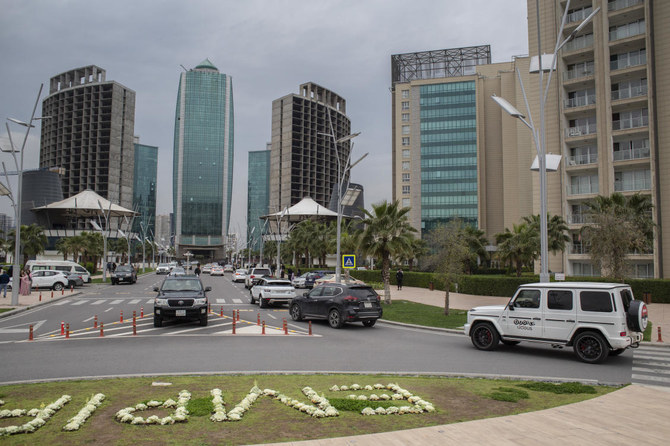
- Irbil, the seat of the semi-autonomous Kurdish region in northern Iraq, was once a backwater provincial capital
- That rapidly changed after the 2003 US-led invasion of Iraq that toppled Saddam Hussein
Rebuilding bombed Gaza homes may take 80 years, UN says

Nearly seven months of Israeli bombardment have caused billions of dollars in damage, leaving many of the crowded strip’s high-rise concrete buildings reduced to heaps, with a UN official referring to a “moonscape” of destruction.
Palestinian data shows that around 80,000 homes have been destroyed in a conflict triggered by Hamas fighters’ deadly attacks on southern Israel on Oct. 7. Israeli strikes have killed tens of thousands of Palestinians.
The assessment, released by the UN Development Programme, said Gaza needs “approximately 80 years to restore all the fully destroyed housing units.”
However, in a best-case scenario in which construction materials are delivered five times as fast as in the last crisis in 2021, it could be done by 2040, the report said.
The UNDP assessment makes a series of projections on the war’s socioeconomic impact based on the duration of the current conflict, projecting decades of ongoing suffering.
“Unprecedented levels of human losses, capital destruction, and the steep rise in poverty in such a short period of time will precipitate a serious development crisis that jeopardizes the future of generations to come,” said UNDP Administrator Achim Steiner in a statement.
In a scenario where the war lasts nine months, poverty is set to increase from 38.8 percent of Gaza’s population at the end of 2023 to 60.7 percent, dragging a large portion of the middle class below the poverty line, the report said.
Doubts grow over Gaza truce plan

- Israel still waiting for Hamas’s response to the latest proposal
GAZA: Doubts grew on Thursday over the fate of a Gaza truce plan that, as the week began, had raised hopes of an end to nearly seven months of war between Israel and Palestinian Hamas militants.
Israel was still waiting for Hamas’s response to the latest proposal, said an Israeli official not authorized to speak publicly.
Mediators have proposed a deal that would halt fighting for 40 days and exchange Israeli hostages for potentially thousands of Palestinian prisoners, according to details released earlier by Britain.
Any such deal would be the first since a one-week truce in November saw 80 Israeli hostages exchanged for 240 Palestinian prisoners.
The war started with Hamas’s October 7 attack on southern Israel that resulted in the deaths of 1,170 people, mostly civilians, according to an AFP tally based on Israeli official figures.
Israel estimates that 129 captives seized by militants during their attack remain in Gaza, but the military says 34 of them are dead.
Israel’s retaliatory offensive, vowing to destroy Hamas, has killed at least 34,596 people in Gaza — mostly women and children — including 28 over the past day, according to the health ministry in the Hamas-run territory.
Much of Gaza has been reduced to a grey landscape of rubble. The debris includes unexploded ordnance that leads to “more than 10 explosions every week,” with more deaths and loss of limbs, Gaza’s Civil Defense agency said on Thursday.
Hampered aid
Humanitarians are struggling to get aid to Gaza’s 2.4 million people, hundreds of thousands of whom have fled to Rafah, the territory’s southernmost point, the United Nations says.
Senior Hamas official Osama Hamdan told AFP late Wednesday that the movement’s position on the truce proposal was “negative” for the time being.
The group’s aim remains an “end to this war,” senior Hamas official Suhail Al-Hindi said — a goal at odds with the stated position of Israel’s Prime Minister Benjamin Netanyahu.
Regardless of whether a truce is reached, Netanyahu vows to send Israeli troops into Rafah against Hamas fighters there. US officials reiterated their opposition to such an operation without a plan to protect the civilians.
US Secretary of State Antony Blinken has urged the Islamist movement to accept the truce plan.
“Hamas needs to say yes and needs to get this done,” Blinken said Wednesday while in Israel on his latest Middle East mission.
In early April there had also been initial optimism over a possible truce deal, only to have Israel and Hamas later accuse each other of undermining negotiations.
Following a meeting with Blinken, Israel’s opposition leader Yair Lapid insisted that Netanyahu “doesn’t have any political excuse not to move to a deal for the release of the hostages.”
Netanyahu faces regular protests in Israel calling on him to make a deal that would bring home the captives. On Thursday protesters set up over-sized photos of women hostages outside Netanyahu’s Jerusalem residence. In Tel Aviv they again blocked a highway.
Israel protests
Demonstrators accuse the prime minister, who is on trial for corruption charges he denies, of seeking to prolong the war.
Fallout from the Gaza fighting has spread throughout the Middle East, including to the Red Sea region where commercial shipping has been disrupted.
US and allied warships have regularly shot down suspected drones and missiles fired by Iran-backed Yemeni rebels who say they act in solidarity with Palestinians.
Criticism of the war has intensified in the United States, Israel’s top military supplier.
Demonstrations have spread to at least 30 US universities, where protesters have often erected tent encampments to oppose Gaza’s ever-increasing death toll.
Talks on a potential deal to pause the bloodiest-ever Gaza war have been held in Cairo involving US, Egyptian and Qatari mediators.
Mairav Zonszein, senior analyst at the International Crisis Group think-tank, said he was pessimistic Hamas would agree to a deal “that doesn’t have a permanent ceasefire baked into it.”
A source with knowledge of the negotiations said on Wednesday that Qatari mediators expected a response from Hamas in one or two days.
The source said Israel’s proposal contained “real concessions” including a period of “sustainable calm” following an initial pause in fighting, and the hostage-prisoner exchange.
The source said Israel’s withdrawal from Gaza remained a likely point of contention.
Egypt’s mediation
Egypt was involved in a flurry of calls “with all the parties,” the country’s state-linked Al-Qahera News reported, citing a high-level Egyptian official who spoke of “positive progress.”
Martin Griffiths, the UN aid chief, this week said “improvements in bringing more aid into Gaza” cannot be used “to prepare for or justify a full-blown military assault on Rafah.”
The US military since last week has been building a temporary pier off Gaza to assist aid efforts. The pier is now more than half finished, the Pentagon said on Wednesday.
In Khan Yunis city near Rafah, foreign aid and borrowed equipment helped to “almost completely” restore the emergency department at Nasser Medical Complex, said Atef Al-Hout, the hospital director.
Intense fighting raged in mid-February around the hospital, which Israeli tanks and armored vehicles later surrounded.
Israel’s army on Thursday said that among strikes over the previous day, a fighter jet hit “a military structure in central Gaza.”
Witnesses and an AFP correspondent on Thursday reported air strikes in Khan Yunis and artillery bombardment in the Rafah area, while militants and Israeli troops battles in Gaza City to the north.
Also in north Gaza, workers unloaded boxes of aid at Kamal Adwan hospital where Alaa Al-Nadi’s son lay motionless in the intensive care unit, his head almost completely swathed in bandages.
Nadi, her own arm bandaged after they were wounded in a strike, feared the hospital’s power could go out, cutting the boy’s oxygen and killing him.
“I call on the world to transfer my son for treatment abroad. He is in a very bad condition,” she said, breaking down in tears.
Iraq students rally for Gaza and US campus protests
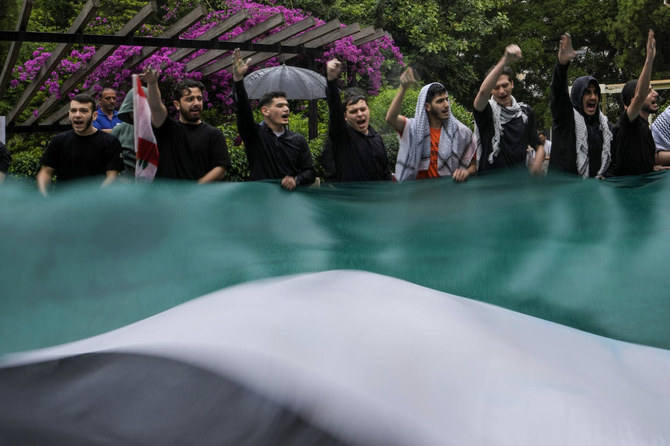
- Students at Al-Nahrain University waved the Palestinian and Iraqi flags
- Iraq does not recognize Israel while all Iraqi political factions support the Palestinian people
BAGHDAD: Dozens of Iraqi university students and professors rallied Thursday at a Baghdad campus in solidarity with Gaza and pro-Palestinian protests at US universities, AFP correspondents said.
Iraqi Education Minister Naeem Al-Aboudi earlier this week expressed his support for the “free voices in universities” around the world, and called for protests in solidarity with the embattled Gaza Strip.
Students at Al-Nahrain University waved the Palestinian and Iraqi flags.
“With all that is happening to our people in Gaza... of course I must be among the first to come to raise our voice,” student Aya Kader, 20, said.
“It is very positive to see the Palestinian flag being waved at American universities,” she said.
Weeks-long pro-Palestinian protests that have swept campuses across the United States have “encouraged us,” she added.
Students and professors also carried banners calling for a “free Palestine,” with some wearing the keffiyeh scarf that has long been a symbol of the Palestinian cause.
“We are here to tell them to stop the killing and to thank the free voices around the world,” said Professor Jomaa Salman, head of the engineering faculty.
“If the storming of Columbia University had happened in another country, especially in a third world country, they would have moved heaven on earth.”
The Iraqi embassy in Washington called Wednesday for “restraint, calm, respect for human rights and peaceful expression” as unrest over Israel’s war in Gaza simmered on US campuses.
Iraq does not recognize Israel while all Iraqi political factions support the Palestinian people.
In 2019, popular protests broke out in Iraq against the ruling establishment, and a security crackdown left more than 600 people killed.
The United States is Israel’s largest military supplier.
Student protesters on American campuses say they are expressing solidarity with Palestinians in the war-devastated Gaza Strip, prompting large-scale police arrests.
The Gaza war broke out after the unprecedented October 7 Hamas attack on southern Israel which resulted in the death of 1,170 people, mostly civilians, according to an AFP tally based on Israeli official figures.
Vowing to destroy Hamas, Israel retaliated with a massive offensive that has killed at least 34,596 people in Gaza, mostly women and children, according to the health ministry in the Hamas-run territory.
Militants also seized hostages during the attack, estimating that 129 of them remain in Gaza, including 34 the military says are dead.
UAE FM discusses Gaza with Israel’s opposition leader
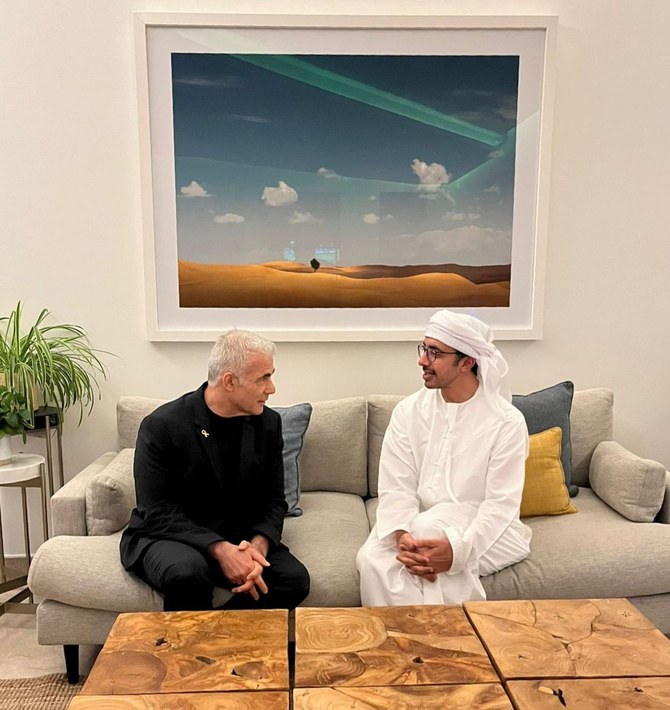
- Sheikh Abdullah stressed the need to restart talks on the two-state solution in Palestine
ABU DHABI: The UAE’s Foreign Minister Sheikh Abdullah bin Zayed Al-Nahyan held discussions on developments in Gaza with Israel’s opposition leader Yair Lapid in Abu Dhabi, Emirates News Agency reported on Thursday.
During the meeting, Sheikh Abdullah stressed the need to restart talks on the two-state solution in Palestine, which he said would ensure permanent regional peace and security.
He called for additional efforts to reach an immediate ceasefire in Gaza, which would prevent the conflict spreading to the rest of the region.
Sheikh Abdullah added that it was important for aid to reach Gaza, and that the lives of civilians should be protected.
Palestinian security force kills Islamic Jihad gunman in rare internal clash
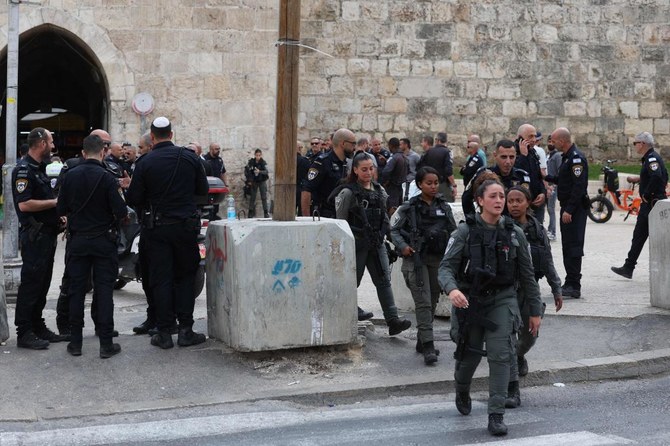
- Al-Foul was “treacherously ... targeted in his car” without provocation, the brigades said in a statement. “This crime is just like any assassination by Israeli special forces.”
RAMALLAH: Palestinian security officers killed a gunman in the occupied West Bank on Thursday, a rare intra-Palestinian clash whose circumstances were disputed and which the fighter’s faction described as an Israeli-style “assassination”.
Palestinian Authority security services spokesperson Talak Dweikat said a force sent to patrol Tulkarm overnight came under fire and shot back, hitting the gunman. He died from his wounds in hospital.
Videos circulated online, and which Reuters was not immediately able to confirm, showed a car being hit by gunfire.
A local armed group, the Tulkarm and Nour Shams Camp Brigades, claimed the dead man, Ahmed Abu Al-Foul, as its member with affiliation to the largely militant group Islamic Jihad.
Al-Foul was “treacherously ... targeted in his car” without provocation, the brigades said in a statement. “This crime is just like any assassination by Israeli special forces.”
President Mahmoud Abbas’ PA wields limited self-rule in the West Bank, and sometimes coordinates security with Israel.
Parts of the territory have drifted into chaos and poverty, with the PA and Israel trading blame, especially since ties have been further strained by Israel’s offensive in Gaza.
Hamas, an Islamic Jihad ally which rules the Gaza Strip and has chafed at Abbas’ strategy of seeking diplomatic accommodation with Israel, denounced “the attacks by the PA’s security forces on our people and our resistance fighters”.
Palestinian security forces and gunmen have exchanged gunfire several times in the last year, but deaths are rare.



